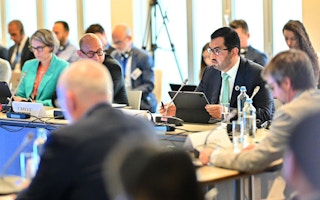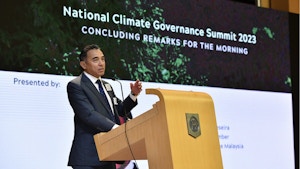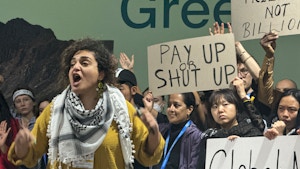The appointment of Sultan Ahmed Al Jaber, who heads the United Arab Emirates’ national oil company, as COP28 president has invited a steady stream of criticism, with the main pushback coming from observers who believe his perceived intimacy with fossil fuel majors could compromise trust in the United Nations’ climate negotiations.
To continue reading, subscribe to Eco‑Business.
There's something for everyone. We offer a range of subscription plans.
- Access our stories and receive our Insights Weekly newsletter with the free EB Member plan.
- Unlock unlimited access to our content and archive with EB Circle.
- Publish your content with EB Premium.
A long-awaited plan of climate action from Al Jaber unveiled last week, however, has renewed some confidence in government circles and civil society that the UAE presidency has a clear vision – at least to scale renewable energy dramatically and to keep a 1.5°C warming threshold in sight.
The plan of action for the COP28 climate summit, to be held in Dubai in December, was put forth at a meeting of governments in Brussels on Thursday, and has been broadly welcomed by political and business leaders, including state representatives from Asia.
In his speech, Al Jaber urged the world to be “brutally honest” about the gaps that need to be filled to reach an “ambitious negotiation outcome” and called for a “holistic approach that brings together both the supply and demand side in an integrated manner” – nuances that some observers say portray how the oil executive president might be mindful about the difficulties that hard-to-abate sectors will face in reducing their emissions footprint. However, critics say the ambiguities are revealing of the complex business interests at play for this year’s COP process.
In an accompanying 15-page letter to ministers, Al Jaber said: “Everyone must work together to renew trust in the COP process, by delivering on previous promises, by accelerating the energy transition, by scaling up and reforming climate finance, and making it more accessible…We must all do our part to ensure we succeed. The credibility of our inclusive multilateral process depends on it.”
The plan is divided into what Al Jaber terms the four pillars: fast-tracking the transition to a low-carbon world; transforming climate finance; focusing on people, lives and livelihoods; and mobilising for “the most inclusive COP ever”.
Beyond the cheers and hurrahs, Eco-Business takes a closer look at the wording in the climate summit agenda and lay out what might be expected for this year’s COP.
Fossil fuel ‘phase down’ and the energy security argument
The COP27 climate summit held last year in Sharm el-Sheikh, Egypt, had flinched on “phasing out” all fossil fuels, with countries coming to a consensus on a more broadly-worded deal to “phase down” coal and other pollutive fuels. Al Jaber’s climate action plan, similarly starts from a position that COP28 negotiators will work towards only a “phase-down” of the main source of emissions driving the global climate crisis, although a mid-century timeline has been included in the agenda.
The COP28 president, in his speech, also said that the phasing down of demand for, and supply of, all fossil fuels is “inevitable and essential”. Two months ago, Al Jaber had been criticised by climate campaigners for saying that the talks will focus on phasing out “fossil fuel emissions”, which most took to mean that the doors remain open for the continued use of fossil fuels, as long as oil and gas majors are able to capture the carbon produced from burning the pollutive fossil fuels or lower their carbon intensity.
The climate action agenda states that an ambitious mitigation outcome will require a consensus to accelerate the phase-down of all unabated coal, and that will lead to “an energy system free of unabated fossil fuels” by 2050. It mentions the importance of considering “economic interests” and a “just and equitable way that accounts for energy security”.
Vandana Hari, founder of a Singapore-based energy market intelligence provider, who recently penned an op-ed arguing for Asia to rally around Al Jaber as COP28 chief, says that the energy security argument is one that Asian developing economies are familiar with as they still find it challenging to secure the renewables and financing needed to charge ahead in the climate fight.
A multilateral process that takes into consideration the greater implementation gap that developing Asia faces and with a pragmatic recognition that the private sector can be part of the solution might be more effective, she said.
“
We need to attack all emissions, everywhere. One, two and three…Let us end the reductive discussion of Scope 1 vs Scope 2 vs Scope 3.
Sultan Al Jaber, COP28 president
1.5°C goal as the ‘single north star’
Since 2015, science has shown that keeping global warming to 2°C above pre-industrial levels – the Paris Agreement-aligned upper limit – would still produce calamitous effects. Al Jaber has made it clear that his COP28 action plan is based on the more stringent goal of 1.5°C.
“This plan is guided by a single north star, and that is keeping 1.5°C within reach,” he told ministers in his speech last Thursday.
Non-government organisations tracking pre-COP narratives, however, have pointed out that the 1.5°C global warming goal can only be achieved by an end to new fossil fuel projects. The California-based Fossil Fuel Non-Proliferation Treaty, for example, said that Al Jaber’s plan, at the moment, is inadequate. The plan does not specifically mention such curbs, but said the goal is to reach a consensus of more than halving the oil and gas industry’s Scope 1 and Scope 2 emissions and phasing out “inefficient fossil fuel subsidies”.
Al Jaber only goes further in his speech to elaborate on his stance regarding Scope 3 emissions – or indirect supply chain emissions – from the operations of fossil fuel companies, which makes up the majority of emissions. He said: “We need to attack all emissions, everywhere. One, two and three…Let us end the reductive discussion of Scope 1 vs Scope 2 vs Scope 3.”
COP28 will also consider an agreement to triple renewable energy capacity and double the rate of energy efficiency improvements across sectors by 2030, including ramping up electrification and enhanced cooling approaches. Governments will conduct for the first time a “global stocktake” that will set out the progress they have made on emissions reduction commitments – known as “nationally determined contributions” or NDCs – they made in Paris.
Al Jaber has requested for all countries to submit their updated NDCs in September, and the UAE has submitted its own revision, with emissions reductions of 40 per cent compared with business as usual.
Oil majors and their influence
Other than leading COP28, Al Jaber is chief of the UAE’s national oil and gas company, Adnoc. His relations with the sector, as well as open attempts to bring fossil fuel executives to COP28 by arguing that they should have a place at the table, have created strong misgivings about his ability to deliver a strong outcome for climate.
Clean energy entrepreneur Assad Razzouk describes it as a “hijack”, as he believes, according to his observations of the strategies that fossil fuel firms take, that these companies cannot be part of the solution.
He told Eco-Business: “An oil CEO simply can’t be president of the climate talks. There is a fundamental and radical conflict of interest here, irrespective of what ‘climate action plans’ are advertised,” he said. He believes that the world should look beyond COP. “Climate action is everywhere, and ramping up. Just not at the COPs.”
Al Jaber’s climate plan does not expressly state what his stance is regarding fossil fuel lobbyists potentially stalling the negotiations. He said he is preparing to run the “most inclusive COP ever” and added that the energy transition will require the world to “redesign the relationship between policymakers, the biggest energy producers and the biggest industrial consumers”, as he called for “brutally honest” conversations among all stakeholders.
Making adaptation finance central to the summit’s success
Last year at COP27, nations agreed to set up a fund for loss and damage, to finance rehabilitation and restoration work in countries stricken by the worst impacts of the climate crisis. COP28 will need to settle the framework for a new deal on finance and deliver on old promises, said Al Jaber in his letter, referring to a longstanding commitment by rich countries to provide US$100 billion a year to poor nations. The target was supposed to be met in 2020, but has not yet been achieved. Al Jaber believes if these needs are not met, it risks undermining trust in the COP process.
He also repeated the demand made by UN secretary general António Guterres to double financing for developing countries to adapt to climate impacts.
The push for multilateral development banks (MDBs) and international finance institutions to reform themselves is also something to watch in the months to come. In his plan, Al Jaber called for a “comprehensive transformation” of the World Bank and other international finance institutions.
A new financial architecture will require stronger international financial institutions that work better as a system, he said.














